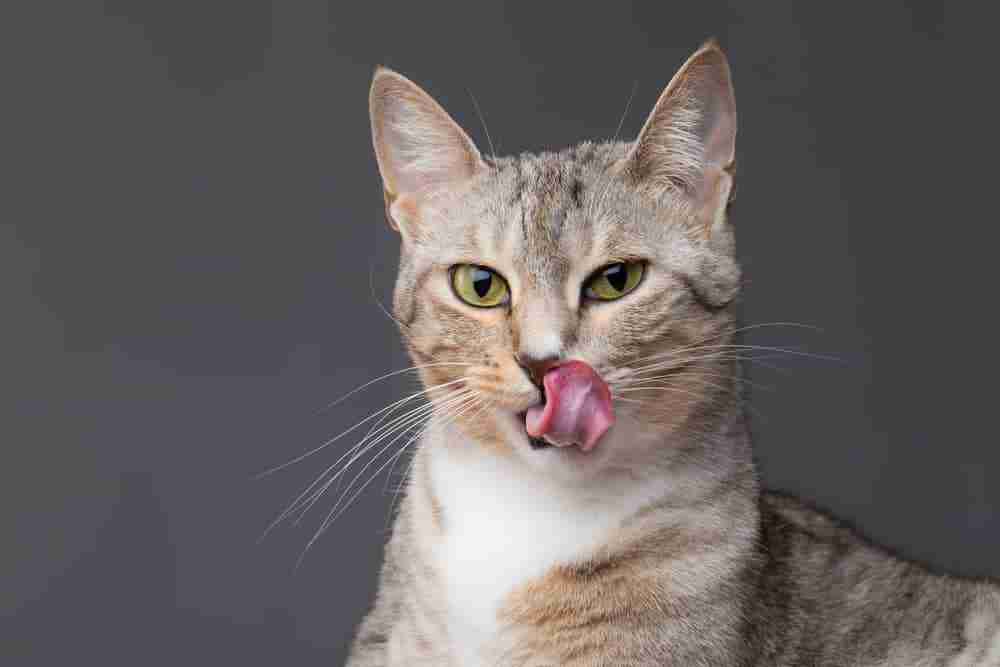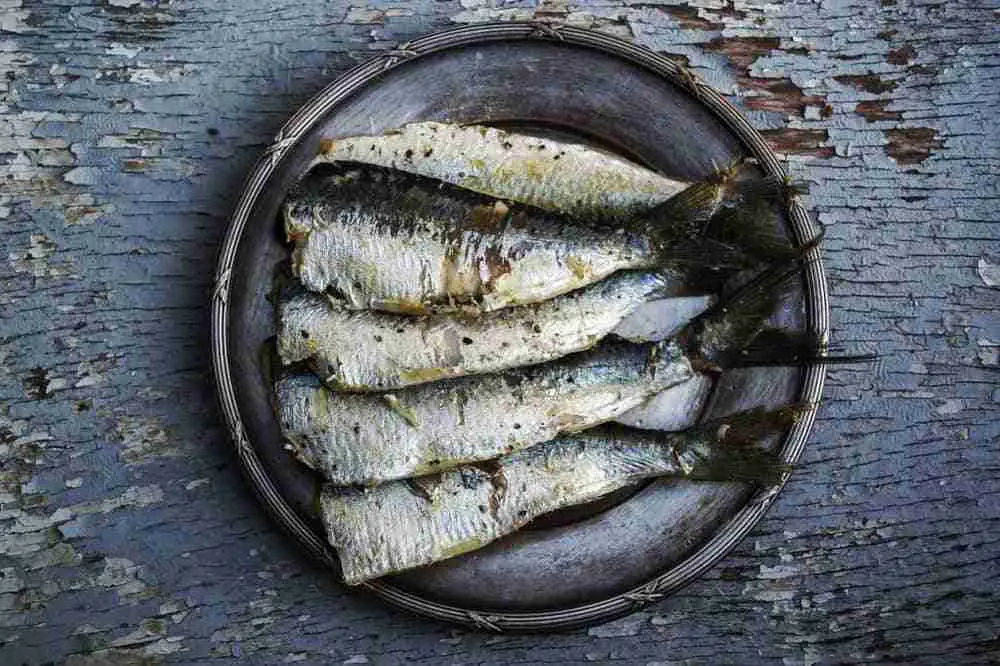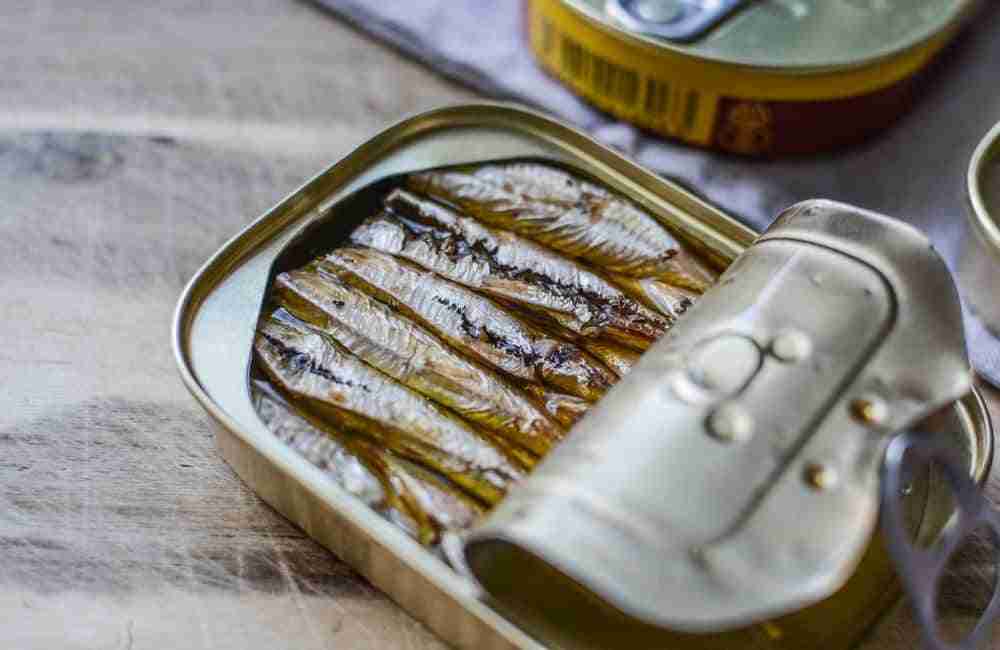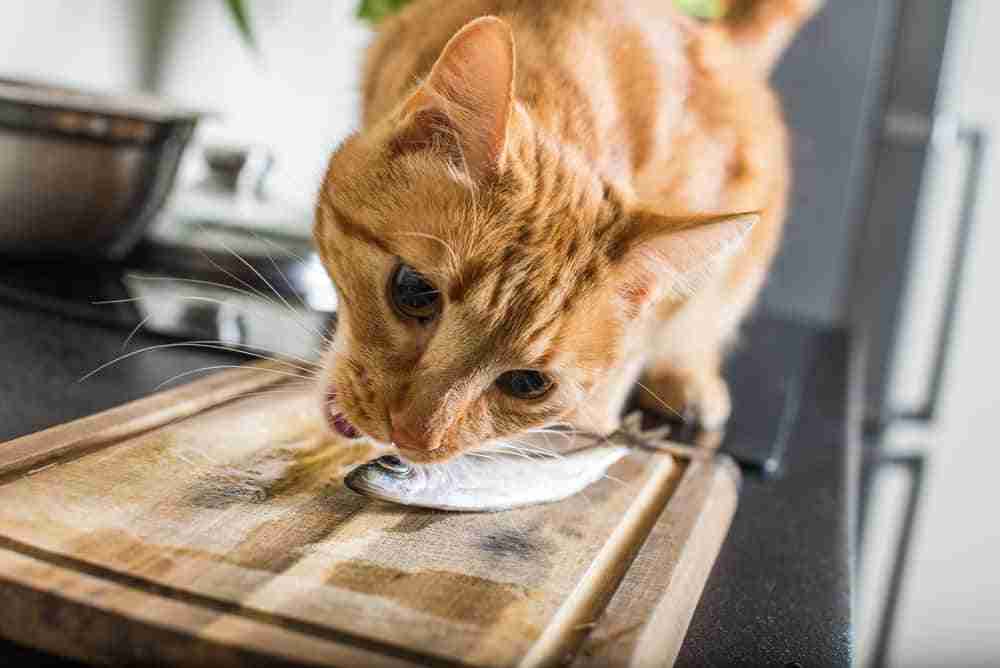I discovered my cat liked sardines (or pilchards) quite by accident. I was trying a change of diet and thought I should include more oily fish in my diet. I bought some sardines in tomato sauce figuring it could make a decent sandwich. I opened the can and was immediately hassled by my cat, Cleo. How bizarre! The level of attention she gave me was far greater than at normal meal times – and she had never even tried this stuff before!
- Why Sardines Are Good For Cats
- Why Sardines Are Not Good For Your Cat?
- Can Cats Eat Sardines Everyday?
- Can Cats Eat Sardines In Tomato Sauce?
- Can Cats Eat Sardines In Olive Oil?
- Can Cats Eat Sardines In Sunflower Oil?
- Can Cats Eat Sardines In Brine?
- Can Cats Eat Sardines In Spring Water?
- Do I Need To Cook The Sardines?
I decided to give her a titbit to shut her up. Not enough to make problems for her, but enough to be a taster – I didn’t really know if feeding your cat these fish was a smart thing to do so I erred on the side of caution. She wolfed the sardine down and expectantly gazed at me whilst licking her lips. I saw no ill effects – no retching or vomiting or sudden onset of paralysis so figured maybe this could be a new food avenue for my picky eater! Sorted!
Sometime later that evening it occurred to me that there might be a reason you don’t see much sardine cat food on the store shelves, what might that reason be? Can cats eat sardines or are they off-limits? I thought I should investigate. This is what I learned about feeding my cat sardines :

Why Sardines Are Good For Cats
Are sardines good for cats? I was really happy to find out that pilchards or sardines can actually be very good for your cat! Here are some of the reasons you should consider feeding your cat sardines :
High Protein, Low Carb
These fish definitely aren’t a species-appropriate food for your cat – no one ever saw a cat fishing for sardines! But, a cat’s natural diet is generally high protein, low carb and sardines most definitely fall into that bracket of food types which is perhaps why kitty finds the stuff so irresistible!
Cats are obligate carnivores. They need animal protein to form energy. They have very little use for carbohydrates. Pilchards score high on protein and low on carbs making them a worthwhile meal for your cat. Fresh sardines also contain taurine. Cats need taurine in their diet as they are not able to synthesize this amino acid themselves. So these fish can make a decent snack for your cat.

Vitamin D and Omega 3 For Bones and Joints
They are oily fish. The oils or fats are high in vitamin d and high in omega 3 fatty acids. This is good news for your cat. Like us, your cat needs vitamin d and omega 3 to promote healthy bones and joints. Unlike us, your cat can’t get vitamin d from sun exposure – it all has to come from the diet. Most commercial pet foods have vitamin d added. Pilchards come ready packed with this essential vitamin!
Omega 3 helps reduce inflammation. In worn out or ageing joints this can be really helpful in humans but it is also really helpful for your cat and their joints. Some pet foods have omega 3 added but sardines are naturally packed with the stuff.
Vitamin B12 For A Healthy Immune System
These fish are rich in vitamin b12. Vitamin B12 is a water soluble vitamin that is crucial for a healthy immune system, digestive system and nervous system.
Your cat gets all of its vitamin b12 from its diet so a source of this vitamin is always useful. Your cat can store the vitamin in its body if required, but it loses the vitamin through urination so really it needs an ongoing source of the vitamin in its diet.
A deficiency of this vitamin will hit your cat hard! Symptoms of a deficiency include weight loss, vomiting, diarrhea, and lethargy.
Sardines are a tasty way to add some vitamin b12 to your cats diet!
Omega 3 For Cancer
There is some evidence, but not overwhelming evidence, that people who have a diet rich in omega 3 fatty acids seem to have less prevalence of cancer. The evidence is fairly mixed but it is enough to consider that it is probably worthwhile getting some omega 3 in your and your cats diet.
You never know, that extra omega 3, as well as boosting joint health, might prevent a deadly case of cancer!
Omega 3 For Weight Loss
Omega 3 really is a wonder compound. Is your cat a little tubby or rotund? Too much eating, sleeping and not enough play? A helping of sardines might help shed some weight!
There is some evidence that omega 3 can help with weight loss. Both human and animal studies have shown that those on a diet who supplement with omega 3 lose more weight than those who diet without the supplementation. So if you have a fat kitty a sardine treat might actually help your cat lose weight!
DHA for Brain Health and Good Moods
DHA is a fatty acid present in omega 3. This fatty acid has been found to have a positive effect on brain health and mood. Specifically, when animals have been fed a diet with a reduced amount of omega 3 in it, the quantity of DHA in their brain reduces and they tend to experience reduced levels of learning and memory compared to animals on diets rich in omega 3 fatty acids.
In humans, it has been found that DHA helps increase blood flow within the brain during mental tasks and seems to improve peoples moods – it is not such a stretch to imagine your cat might have a similar response to DHA as we are both mammals…
All in all, if you want kitty to stay in top mental shape, you might find some oily fish like pilchards are an ideal way of boosting those impressive omega 3 fatty acids!

Why Sardines Are Not Good For Your Cat?
It was all looking so good. Loads of benefits to dishing out the sardines to my cat! But, inevitably, it is not as straightforward as we hoped. Here are some solid reasons not to go all-in on pilchards when planning your cat’s diet :
High Salt Content
The canned version of the fish are high in salt. Now, whether you are human or cat, you need to watch your salt intake as too much can increase your blood pressure which may lead to a heart attack or stroke or might damage your kidneys. Cats have a high prevalence of kidney disease so you have to be very careful not to get carried away with salt.
Fresh sardines are not so bad on the salt front and they can be blanched overnight to reduce salt content – chances are most people are looking for convenience so they are likely to be considering feeding their cat with the canned variety. Be very careful with the salt…
Heavy Metal Poisoning
Unfortunately, seafood, particularly oily seafood, tends to concentrate the heavy metals us humans dump in the oceans within their bodies. Eating a diet rich in contaminated seafood can lead to heavy metal poisoning in you or your cat.
You are going to have to eat a lot of it for a long period of time but none the less the risk is there.
Be mindful of the risks and opt for a balanced diet rather than feeding your cat sardines everyday.
Can Cats Eat Sardines Everyday?
Your cat could eat sardines every day but it would be a bad idea and would lead to health problems. The major problem is the salt content, particularly of the canned fish. Too much salt is bad for you or your cat.
You should feed your cat pilchards as an infrequent weekly treat so they get some of the benefits of eating them and minimize the risk of eating too much salt or getting heavy metal poisoning. If you are buying the canned version go for the low salt option.
Can Cats Eat Sardines In Tomato Sauce?
Often canned sardines are sold in tomato sauce. Can you give these to your cat? Yes, you can. The tomato sauce poses no danger to your cat (unless it has onion or garlic added), however, it is high in carbohydrate so has no nutritional value to your cat and is likely to be laced with salt to balance out the sweetness of the tomatoes. Salt and carbohydrates are not good for your cat in excess. A decent solution is to minimize the sauce you give to your cat if you are going to use tinned sardines in tomato sauce.
Can Cats Eat Sardines In Olive Oil?
Some tinned pilchards come canned in olive oil. Olive oil is not dangerous to your cat. Indeed, a little olive oil may help with hairballs! The oil may lubricate your cat’s digestive system improving the evacuation of hair and fur from their digestive tract. If you are feeding your cat tinned sardines in olive oil try to keep the oil component down to a teaspoon max.

Can Cats Eat Sardines In Sunflower Oil?
Sardines in sunflower oil are perfectly fine for your cat just as sardine in olive oil are. They should have a similar hairball busting effect! Take the same precautions of not going too heavy on the oil when you serve them up.
Can Cats Eat Sardines In Brine?
Feeding your cat the fish that have been canned in brine is not a good idea. Brine is essentially salty water. It is used for the preservation of the fish. You should avoid this option as the salt content is likely to be way too high for your cat…
Can Cats Eat Sardines In Spring Water?
If you are going to feed your cat the canned version of the fish then the best option is to use sardines that come in spring water. These are likely to have the lowest salt content out of all the canned options and you don’t have to be concerned as to whether you are giving your cat too much oil. This option is likely to be the healthiest canned option.
Do I Need To Cook The Sardines?
You may have an option to feed your cat fresh pilchards. If you do you will be happy to hear that your cat can eat the cooked version – but avoid feeding raw! If you are worried about the salt content of the fresh fish they can be blanched in freshwater overnight to draw the salt out of their bodies before you feed them to your cat.
Sardines make a tasty treat for your cat that they really appreciate and carries a load of health benefits. Just watch out for the salt. Hope this info helps…
